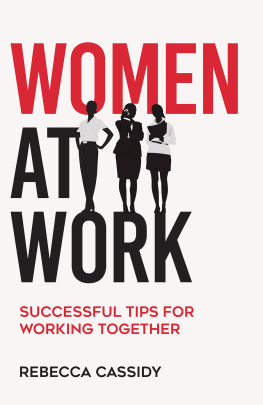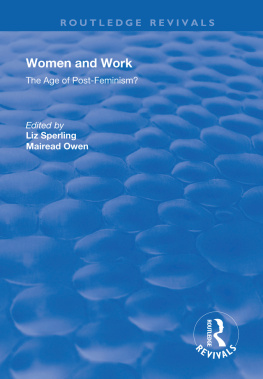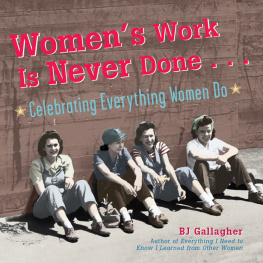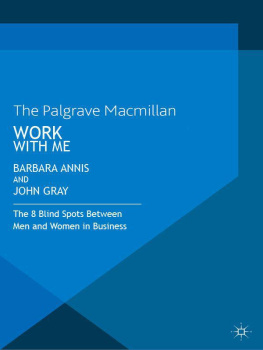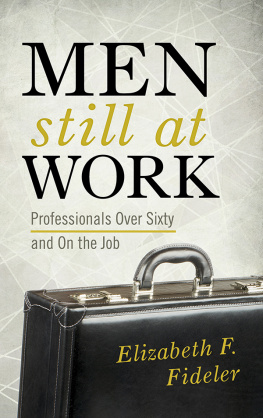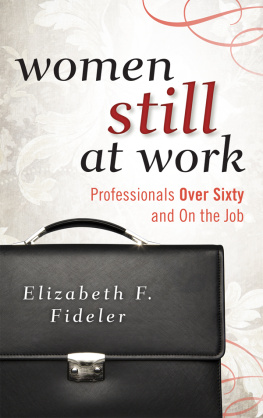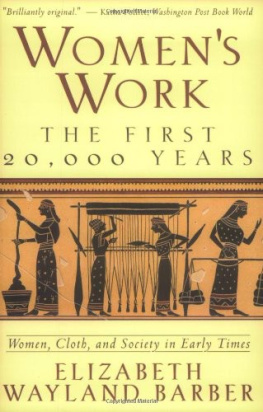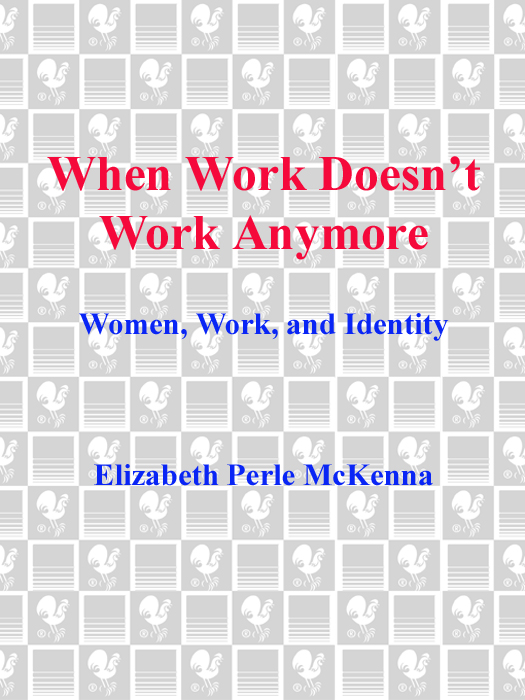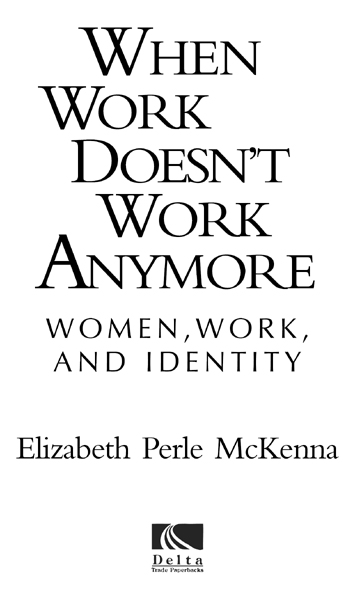HIGH PRAISE FOR
WHEN WORK DOESNT WORK ANYMORE
ALL WORKING MEN AND WOMEN CAN BENEFIT FROM [McKENNAS] SUGGESTIONS to learn how to fail, say no to bosses and assignments, and separate who you are from what you do. Such prescriptions for redefining worth and success are not abundantly simple, but they are abundantly sane.
Time
[McKenna] offers valuable advice to help women get their work lives back in balance.
New Woman
McKenna interlaces her personal story with revealing interviews with other women; many readers will find themselves in these pages. She wants readers to examine the values that guide our lives, the moral compromises we make at work, the small decisions that eat away at larger ambitions. This is an admirable and timely goal.
The New York Times Book Review
ENGAGING, INSIGHTFUL AND SPRINKLED WITH ACCESSIBLE IMAGERY a thoughtful, tormented journey of identity. What sets McKennas book apart is its strong indictment of the way corporate culture works, not the way women work.
Baltimore Sun
Please turn the page for more extraordinary acclaim.
[AN] ELEGANT, WELL-THOUGHT-OUT ARGUMENT.
Entertainment Weekly
Liz Perle McKenna insightfully explores the dilemma faced by executive women who attempt to live up to both the fathers model and the mothers model, and find that more is less. Her book will become a bible to the generation of women who were told they could have it all but nonetheless wound up feeling unfulfilled.
Hope Edelman, author of Motherless Daughters
McKENNAS ANALYSIS IS SOUNDAND TIMELY.
Kirkus Reviews
A VOICE WORTH LISTENING TO So provocative and convincing is [McKennas] book that it is likely to motivate many women to move from a culturally approved value system to a more personal one.
Publishers Weekly
A Delta Book
Published by
Dell Publishing
a division of
Bantam Doubleday Dell Publishing Group, Inc.
1540 Broadway
New York, New York 10036
The names and identifying characteristics of some of the individuals in this book have been changed to protect their privacy.
Copyright 1997 by Elizabeth Perle McKenna
All rights reserved. No part of this book may be reproduced or transmitted in any form or by any means, electronic or mechanical, including photocopying, recording, or by any information storage and retrieval system, without the written permission of the Publisher, except where permitted by law. For information address: Delacorte Press, New York, New York.
The trademark Delta is registered in the U.S. Patent and Trademark Office and in other countries.
eISBN: 978-0-307-79496-3
v3.1
For Steve,
Who knew
Acknowledgments
My deepest thanks go to the more than two hundred anonymous and pseudonymous women who spoke into the little recorder and to the thousand more who answered a very time consuming survey. You gave of yourselves without recognition and I hope this book has honored your lives.
Everyone should have a friend like Richard Pineor an agent for that matter. He and his astonishing associate Lori Andiman never wavered in their wisdom, support, and belief. Their profound intelligence about publishing, and about life, infuse this book. I will never have enough words to express how important they are to me and how grateful I am to them.
I have been most fortunate to have been published by Dell, where I have been the recipient of brilliant and attentive publishing. To Leslie Schnur, friend, editor, and great publisher, my deepest gratitude. Jackie Cantor has been a terrific editor, full of ideas, energy, and wisdom. My thanks, too, to Carole Baron for her kindness and her belief in this book. Also at Dell, I want to thank the gifted Carisa Hays, Tracy Locke, and Karen Mender. What a wonderful team they make. I have been in the best of hands with Lynn Goldberg and Camille McDuffie, publicists extraordinaire. To my Bantam Doubleday Dell friends Don Weisberg, Dave Lappin, Gail Browning, Mary Lange, Sally Johnson, and all my ex-colleagues in the sales department, thanks for having me back and listening to me one more time. And to Jack Hoeft, my deepest thanks for being a great mentor and longtime friend.
Its impossible to say how much Jane Isay contributed to this book. She is the discerner of the straightest line between two arguable points and the unswerving teller of truth, a great friend, and most gifted editorial sage. This book has been the beneficiary of her brilliance, and I am profoundly grateful to her. A thousand thanks, too, to Marilyn Abraham, who knows how to make books work and who helped me figure out what I was trying to say and the best way to say it. To Sue Wels, Adrian Allen, Christine Albertini, Lisa Queen, Stephanie Levi, Ann Patty, Hope Edelman, Susan Ginsberg, E.D., and Roger Straus III, who read this book or endured endless conversations about the subject, my deepest gratitude.
Enormous thanks go to Mark Levine, EVP Director of Strategic Planning for Wunderman Cato Johnson, for his invaluable and critical help with the research for this book. My thanks, too, to Michelle Smilek, who provided personal and sometimes technical support way above and beyond the call of duty.
I want to express my wonderment and gratitude to Anna Quindlen, Gloria Steinem, Letty Cottin Pogrebin, Janet Andre, Lillian Rubin, Juliet Schor, Idelisse Malav, Elizabeth Debold, Marie Wilson, Shelly Lazarus, Shoya Zichy, Rosalind Barnett, Susan Faludi, and Wendy Kaminer. These incredible women whose lives are full to overflowing never hesitated for a moment to share their knowledge and experience with me. If all the world would act in kind, this book would not need to be written. They are truly inspirational.
My father taught me how to write. A tough critic with the worlds most tender heart, I can never thank him enough for all he has given me. To Yuen Yee Kee, thank you for being part of our family, for loving our son, and for teaching him your gentle heart. And to David, my thanks for not playing with my computer and putting up with Mama, shut up in a room, and not coming out for hours at a time. This is called work.
Finally, my deepest gratitude goes to my husband, who believed in me before I believed in myself and without whom this book would never have been written. I am the luckiest of women.
Contents
CHAPTER 1
Great Expectations
CHAPTER 2
When Work Becomes Identity
CHAPTER 3
The Price of Success
CHAPTER 4
When Work Stops Working
CHAPTER 5
Resistance at the Turning Point
CHAPTER 6
The Importance of Money
CHAPTER 7
Changing
CHAPTER 8
Work That Works
CHAPTER 9
Men, Work, and Identity
CHAPTER 10
Balance and Meaning
Introduction
H ERE IS MY STORY . I T IS EITHER A CAREER womans fantasy or worst nightmare. In all probability its a little of both. But one day, after years of dedicated work, pleasure from what I did, and a rewarding record of achievement, I walked into my bosss office and quit. The decision wasnt sudden, even if the action was. It had been a long time in the making. I was tired, depressed, and no longer enjoying a job I had once loved. To stay in my position I had been paying an increasingly heavy price in pressure, politics, and stress. I was losing perspective about what was important to me. The quality of my life was lessening at the same time that quality was becoming more important. I needed a break and I wanted to rethink what my priorities were. For years I had gotten everything I needed from work and I felt puzzled, betrayed, and frightened that my career now seemed to be the problem, not the solution. I knew I had to make some changes but I didnt want to give anything up. Certainly not my career, which was sacred ground and synonymous with who I was. But there was less and less room for my lifewhatever that was. If someone had told me then that giving up my professional identity would restore my love of work and then some, I would have asked them when they were released from the nuthouse. But thats what happened. It would take some time, though, before I discovered what enormous rewards were in store for me.


